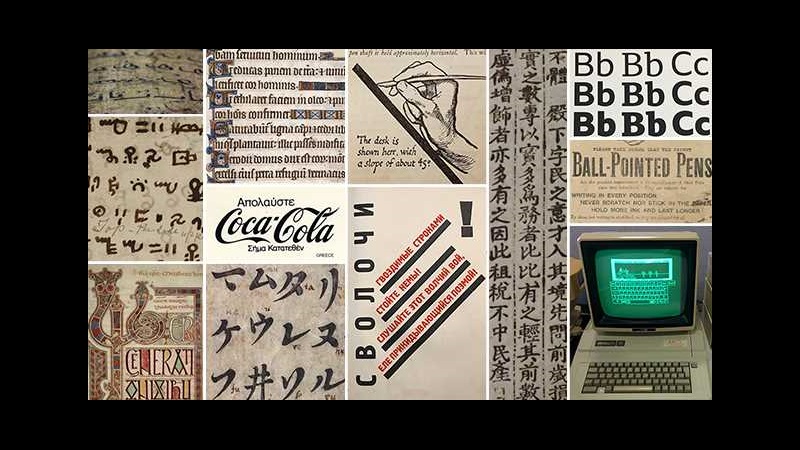That the internet is a revolutionary technology is a cliché by now. Indeed, the signs of this change are all around us, in the smartphones which so many constantly clutch and social media that shares and shapes opinions, not to mention having instant access to vast quantities of information and the ability to connect directly with almost anyone, anywhere, at any time.
In some ways, however, these are all used as mere extensions of our previous, industrial-age of doing things. Computers still rely on office analogies, with desktops, files and folders, pages and text messages. Industries from publishing to manufacturing to truck driving, to sales and commerce have been or are in the process of being overturned. But here, fifty years in, though the internet has lived up to many breathless predictions of this brave new world, the technology is still being developed. Yet no single event has overthrown that paper-based world of the past for the new one of the glowing screen.
Changes in communications and data storage technology have sparked social revolutions many times in the past. The invention of writing allowed local trade networks to grow into civilizations, with written records and laws, enabling the rise of kings and temples. The change from thick, heavy clay tablets to thin, light papyrus allowed more information to be stored, shared farther and more easily, powering the growth of nations, empires, and world religions.
Scrolls being replaced by smaller, more compact codices – books with pages written on both sides – further allowed information to be distribute, preserved, and accessed more easily. Instead of the expensive massive volumes that had to be shared among many users, chained in Dark Age library collections to prevent theft, numbers of small, easily portable books each one able to fit in a pocket could be owned by individual Renaissance scholars. Knowledge quickly became so great that no one person could ever know everything, and so intellectual specializations flourished.
But it wasn’t all progress. When the Muslims took Egypt and eventually stopped selling papyrus to Europe, the lack of materials with which to communicate strangled Western intellectual development. This, as much as the death of long-distance trade in general, contributed greatly to the grim stagnation of the Dark Ages. It would take centuries until first expensive parchment made from animal skins, and then cheaper rag and plant-based paper invented in China, could provide enough writing materials to slowly bring the West up to speed again.
But the biggest technological revolution since the invention of writing was that of mechanical printing, also originally from China. However, the West’s possession of a simple, regular character set, with far fewer glyphs than those needed for Chinese and much simpler to reproduce than the flowing variations of Islamic calligraphy, gave movable type a greater power and more immediate impact in Europe than anywhere else.
Through the presses were spread identical sets of data far and wide: the discoveries of the Age of Science, the new knowledge of the world provided by explorers, the recovery of ancient literature in the Renaissance, and the dissemination of radical new political philosophies of the Enlightenment. But the real social revolution due to printed books came with the Reformation.
The Reformation is generally thought about in the spiritual terms in which the Reformers and their Catholic opponents spoke. But the controversy was couched in such language largely because of the medieval Church’s vast influence on society. Since Christianity is a book-based religion, the Church had become the leading educator, publisher, and preserver of literacy through its monasteries. Its teachings formed the basis of the entire social order putting kings, churchmen, warriors and peasants all in their places; it was the single richest landowner on the entire continent with many privileges.
But by the time Martin Luther nailed up his propositions in Latin on a church door for debate, an entire class of secular scribes had grown up outside the Church. They served lawyers and government, students, scholars, and literate nobles. It was the start of the publishing industry.
What allowed it to flourish was Gutenberg’s press. For nearly seventy years before Luther, printers had been spreading the technology, along with new ideas and literacy. The first advertisement in English, for instance, was a small ad by the printer Caxton for books “goodly cheape”. Yet debates, such as Luther wanted, had been conducted in formal Latin within the Church for centuries and never had stirred up much trouble outside the ranks of theologians before. After all, no translation of the Bible into the common tongues was even allowed; in fact, it was a crime for laymen to read it in Latin without permission.
What happened was that some unknown enterprising soul there in Wittenburg saw the notice, translated it from scholarly Latin into everyday German, and printed it. Its electrifying contents, which challenged the worldly corruption and pretensions of the established religious order, rapidly spread far beyond the German city. Other printers copied it and soon the Reformation was on.
Luther had the good sense to follow up with popular treatises in his native tongue to defend his ideas. Since the printing of his translation of the Bible in German quickly went beyond the control of the ecclesiastical authorities, he gave every person who could read the chance to decide what they believed for themselves.
The social conflict was immediate, immense, and bloody, taking well over a hundred years before a workable solution was agreed to by an exhausted continent at the end of the Wars of Religion. A violent Peasants Revolt was sparked in Germany just a few years into the Reformation, so fierce that Luther published a brochure calling on German nobles to slaughter the farmers. Many monasteries and nunneries were emptied, Church lands were acquired by nobles and kings, a new sense of individual worth and empowerment came about, and the modern age began to take shape.
Since then, of course, there have been other changes. Cheap paper allowed newspapers to be printed, allowing ordinary people to keep up with events and enabling democracy, while the telegraph lent news a near-instantaneous worldwide reach. Radio and television gave events much more immediacy and emotional impact to consumers as they could now hear and see them, often in real time.
Radio gave much more clout to leaders who could speak well. Hitler and Stalin both used it to spread their propaganda, while Roosevelt used it to talk the country out of depression and later into world war. And Kennedy’s success against Nixon in the presidential TV debate due to his better looks and confident demeanor is well-known, though radio listeners thought Nixon won. But broadcast media are, just like film and books, mainly means of consumption. The ordinary user does not contribute much; the technologies are so costly and complicated that there was little chance for an ordinary person to break through on their own.
The internet certainly changed all that. Now there are “influencers” everywhere, and anyone can express their passions and ideas on websites, in blogs, posts on social media, and videos on YouTube. As in previous such communications revolutions, the new, easier, and cheaper ways of doing things have completely bypassed the gatekeeping elites. Everybody can freely express their opinions online; just about anything, no matter how brilliant or stupid.
And therein lies the key difference with this medium that has not been fully appreciated yet. For the internet, despite the comforting, assumed anonymity that sitting behind a faceless screen gives, is not a consumer medium – it is fully participatory. Whether the user intends it to be or not.
For the last twenty years, big corporations anxious to use this power to sell people goods have been carefully watching and learning how to glean both the broadest and most intimate information about those online. And they’ve then used those same tools to shape and direct users’ reactions. It’s a vicious cycle that chiefly empowers those in charge of big online presences.
Everything one does online gives away information about themselves. This data can be invisibly collected and then manipulated against the very people who provide it. Thus the madness of the last two elections, when both sides, (particularly one) harvested data on their own followers or those interested to order to influence their vote. Hence, the outraged cries of “fake news” when people are fed even more extreme views skewed from reality based entirely on their own feelings. This explains the irrational anti-vaccination positions that people being subtly worked on by the West’s adversaries through Facebook and other media stubbornly cling to as well.
So the political campaigns in the West and China’s massive online surveillance and social scoring presence have shaped the way for the revolution that is to come. But neither have had online wildfire spread through all levels of society; no single burning issue has yet come along to electrify users and utterly demolish barriers the way Luther’s theological criticism of Rome’s fund-raising methods did.
And possibly, no one will. For the internet is inevitably fragmenting as each power-bloc tries to defend its users from others and there is no universal authority over all. But on the internet, the traditional economic models of scarcity and wealth no longer work at all. They have to forcibly applied – and thereby lies the weakness of the entire house of cards. The whole global social order is highly unstable, ready to be dramatically overturned once again.
It might just take the right spark (UAPs perhaps?), an issue that affects everyone on the planet, and/or a leader or demagogue with the vision and will to seize the moment. The technology is now available, and after fifty years the internet is both mature and essential enough to reach, react to, and influence everyone.
Hold on and keep your fingers crossed. This wild ride may not have even really begun yet. And keep watching the skies.

